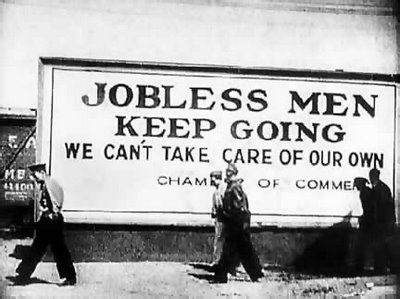GLOBAL GOVERNANCE IS ARGUABLY THE NAME for what might pass these days for "a committee for the management of the affairs of the bourgeoisie as a whole" – though we should recall that the much repeated phrase by Marx and Engels stated that "the executive of the modern state" filled this role, not, for instance, the legislature or other state institutions.
Jobs for All
Recently, George Fish had a piece on the New Politics website entitled Open Programmatic Proposal to the Broad U.S. Left for Directly Dealing with the Present Unemployment Crisis. I urge New Politics readers to read and consider Fish's proposal.
Welfare in France: A Review
The Bureaucrat and the Poor: Encounters in French Welfare Offices
By Vincent Dubois
Ashgate, 2010
Originally published in French as La vie au guichet: Relation administrative et traitement de la misère By Economica, Paris 2010 (1st edition 1999) Translated by Jean Yves-Bart
Something Fishy about the Pew Report
Everyone knows that there’s an enormous looming crisis of underfunded public pensions, a veritable ticking time bomb that will saddle every man, woman and child with insurmountable debt. We know this because, among other reasons, the widely respected Pew Center for the States published a study entitled, “The Trillion Dollar Gap.” We know this because it echoes through the media — print, internet or talking head. A Google search shows more than 29,000 results for this pairing.
Simple Solutions
There are three simple solutions to the deficit, Medicare, and the Social Security problems.
Schaar on Tunisia
Stuart Schaar has written an especially astute analysis of events in Tunisia and beyond. His article was published on February 6 in Mumbai, India by the Economic and Political Weekly. Schaar is the co-author of THE MIDDLE EAST AND ISLAMIC WORLD READER. He is professor emeritus of Brooklyn College and is now living in Morocco.
Open Programmatic Proposal to the Broad U.S. Left for Directly Dealing with the Present Unemployment Crisis
Carl Davidson, organizer for CCDS [Committees of Correspondence for Democracy and Socialism] and one of its four National Co-chairs, recently e-mailed me on what it was doing in terms of addressing the unemployment crisis in the U.S. today, that direct and nasty continuing fallout from the still-current recession. He wrote:
Family Policies in Post-Communist Nations: Reply
In response to Saxonberg:
There is such widespread ignorance about communism and socialism that I think it is important to call those countries Stalinist rather than Communist or state socialist.
Family Policies in Post-Communist Nations
I think that Betty Reid Mandell made some interesting points in her discussion (in New Politics, Summer 2008, Vol. XII, No. 1, Whole # 45), but she has some misconceptions.
Genocide Denial Light
In a sober, balanced sketch of the history and historiography of the 1915 Armenian genocide included in a two-part article on Turkey published in the London Review of Books in September 2008, Perry Anderson notes that the perpetrators’ academic defenders have largely abandoned a discredited strategy of blanket denial for one of minimization or relativization, now increasingly discredited in its turn.
Co-opted?
Venezuela, a moderately prosperous nation with rosy relations with both the United States and global capital, was an unlikely setting for a socialist renaissance. The 1998 election of Hugo Chávez appeared to be nothing more than a parliamentary victory for a bombastic social democrat, surprising but hardly epochal.
"We Want To Be Heard!"

Uniformed agents of Mexico’s Federal Investigative Agency (AFI for its initials in Spanish) yanked three inmates out of their cells in the minimum-security state prison at Ixcotel, Oaxaca in November, 2008 and transported them to San Bartola Coyotepec, another Oaxaca state prison, for "interrogation." One of the three inmates, Victor Hugo Martínez, told activist friends that the federal investigators beat him and threatened to "make your family pay" if he didn’t confess in full to crimes of which he’
The Media, the Poor, and SSI
I wrote a letter to the Boston Globe in response to a series of 3 articles that appeared in the Globe describing how parents are desperately trying to get their children on SSI (Supplemental Security Income) and are persuading doctors to prescribe medication so the children will be eligible.
The Crime of Poverty

Loïc Wacquant has expanded the theory of the neoliberal state beyond the usual economic definition. He has linked the criminal justice system with the welfare system as two parts of the same policy of enforcing conformity to an unstable job market of temporary, part-time, low-paid, and flexible employment. Other criminal justice scholars and welfare scholars have analyzed these as separate spheres. While they have seen both as repressive, they have not seen them as interconnected.
The Jobs Crisis: How to Solve It and Begin to Fix Our Broken Economy

The United States has an ongoing jobs crisis that has been crippling our people and our economy for nearly two years. In September 2010, 14.8 million people were officially unemployed, 15.7 million were either forced to work part-time or were jobless and no longer looking for work and another 16.3 million were the working poor. Thus, almost 47 million people were afflicted by unemployment or underemployment (see table 1). Moreover, the numbers multiply when the families of the unemployed are included.
Explaining Poverty
Stephen Steinberg’s Boston Review article “Poor Reason: Culture still doesn’t explain poverty“ is a breath of fresh air, reminding us that the path toward ending poverty is creating decent jobs for everyone.
A Clash of Fundamentalisms
In our previous articles, we emphasized the ideological nature of today’s problematic Islamic “threat.” Historically this “threat” fits into an established tradition of hysterical propaganda campaigns – whether against “Indians,” “Negroes” or “Reds” — which distort and exaggerate real and potential challenges to U.S. capitalism /imperialism so as to justify violence, state terror and wars of plunder. If the truth is “the first casualty” in war, then democracy is the second. Although framed by the U.S.
Contextualizing the Threat of Radical Islam: “Urgent Threats” of Yesteryear
[Editor’s note: This is the second in a series by Richard Greeman.] To understand the lunacy of the problematic Islamic “threat” currently being hyped in mainstream U.S. political discourse, we need to place the concept in the historical context of Western, particularly U.S. imperialism’s collective self-image. White American identity has from the beginning defined itself in opposition a dangerous, threatening, darker “other” who had to be conquered, subdued, and/or exterminated : in the first instance the “savages” native to the Americas.